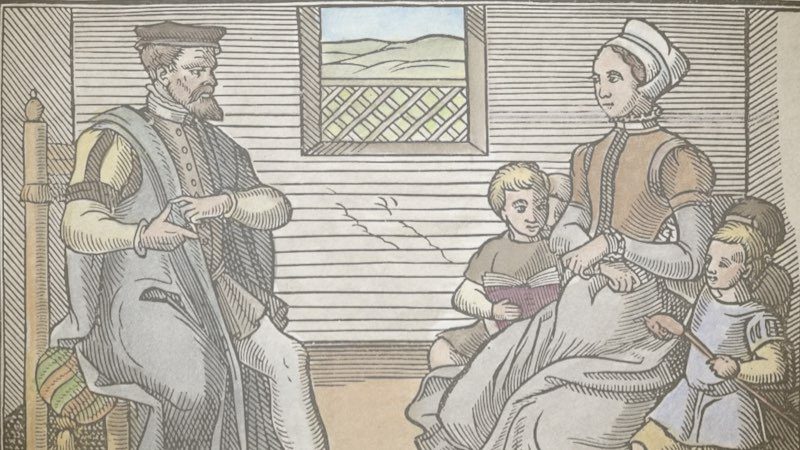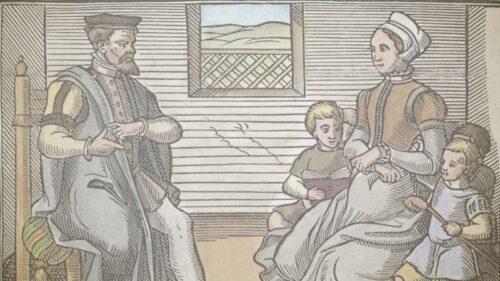
Chapter 2
James Fontaine — Fond of study — Travels as tutor to a young nobleman — Called to the churches of Vaux and Royan — Marries an English lady — Second marriage — His personal appearance — Habit — Labors in the ministry — Capuchins and Jesuits come to hear him preach — Summoned to appear before the governor for preaching on the ruins of the Church — A second summons — Anticipation of future persecution — Death
I now proceed to my own father, who at an early age discovered great aptitude for study, and a very serious turn of mind. He was fortunate in gaining the friendship of Mr. Merlin, a minister at Rochelle, and this worthy servant of God assisted him greatly in his education, and recommended him as tutor to a near relation of the Countess of Royan, in which station he accompanied his pupil to the College of Saumur, and while superintending his studies there, completed his own preparation for the ministry.
Before entering on the sacred office, he travelled with this youth through various countries, and thus had the opportunity of acquiring several foreign languages in perfection. They made a long stay in London, and there my father fell in love with a very beautiful girl of the name of Thompson. She was of good family, well educated, spoke the French language with fluency, and played well on the spinette. They exchanged vows and portraits, and he returned to France with his young lord.
No sooner had he arrived than he received a call from the united churches of Vaux and Royan, and he was settled there by the authority of the synod; and from the very first he was most tenderly beloved by his charge. At the end of a year, he asked and obtained permission to go to London, to fetch her who had all this time held his heart captive, and who was herself faithfully waiting for him. They were married in the year 1628, my father being about twenty-five years of age. They lived together twelve years, and had several children.
In about a year after her death, my father married my mother, Mary Chaillon, of Rue au Roy, a village about a mile and a half distant from the town of Pons, in Saintonge. She was a handsome brunette, twelve years younger than her husband, and had a fortune of four thousand francs. During the life of his first wife, my father had lived in a small, inconvenient, ready-furnished house in the borough of Vaux. After his second marriage, he was persuaded by my mother to purchase a pretty little estate called Jenouille, and the manor of Jaffe near to it; he added some commodious apartments to the house, and made it a very comfortable and desirable residence. I was the youngest child of my parents, and have but little personal recollection of my father, being only eight years old when he died. He was a man of fine figure, clear complexion, pure red and white, and of so dignified a deportment that he commanded the respect of all with whom he came in contact. He was remarkably abstemious, living chiefly upon milk and vegetables until the decline of life, when, by the advice of his physician he went upon a more generous diet. He absented himself on festive occasions, but never failed to visit every family in his flock twice a year. The sick and afflicted were attended to as soon as their affliction was made known to him. When it was understood that he was praying with the sick, crowds would flock to hear him, filling the house; for you must know that in that district all were Protestants, save four or five families. He was most zealous and affectionate, and employed all his knowledge, his talents, and his studies in the service of God, and it was most gratifying to him to find his labors thus appreciated by his flock. He had great learning, quick and ready wit, clear and sonorous voice, natural and agreeable action, and he always made use of the most chaste and elegant language; and genuine humility crowning the whole, gave such a charm to his discourses that he delighted all who heard him.
I must mention an instance illustrative of his facility in preaching. On the afternoon of a communion Sunday, just after reading his text, which had been selected with reference to the services of the morning, he perceived some Capuchins and Jesuits entering the church; he paused — and addressing himself to his own people, he said, that the text he had at first taken was intended for the edification of those who, by the grace of God, were already well informed in the pure religion, but as these people were still in ignorance and superstition, he felt it a duty to leave the ninety and nine sheep, and endeavor to bring back the lost sheep to the fold. He then opened his Bible, and read a controversial text, and treated the subject with so much force and perspicuity, that the fathers were obliged to confess, on going out, that they never heard error (as they called it) so well defended.
When there was any difference between pastor and flock, he was usually the person appointed by the synod to go and endearour to heal the breach, and he was almost always successful, softening the hearts, and drawing tears from the eyes, of his auditors. He was invited to take charge of the church at Rochelle, where the minister’s salary was just twice as large as that which he received. He refused, for he had not the heart to abandon a flock by whom he was so tenderly beloved.
I have mentioned that he was pastor of the united churches of Vaux and Royan; and at the commencement of his ministry he preached in one church in the morning, and the other in the afternoon alternately, the distance between them being two short miles. After a time the church at Royan was pulled down, in conformity with an order in council, and my father persisted in preaching on the ruins. The governor was enraged when he heard of it, and summoned him to appear before him. My father defended himself on the plea of ancient privileges and liberties; to which the governor made answer, that he knew of no privilege or liberty to which a subject was entitled but such as had been granted to him by the king, the council, or the ancient laws, and that he had ascertained that this church had been erected without permission, (which was very true,) and therefore as its building had been an act of usurpation, its demolition could not be regarded as an arbitrary stretch of power, and surely there was no great hardship in his followers at Royan having the trouble to walk over to Vaux to hear him. This was unanswerable, so of course he had to acquiesce.
Soon after this, there was another order in council forbidding Protestant ministers to appear in their clerical robes in the streets; my father felt this as an indignity, and continued wearing his as heretofore. For this offence he was summoned a second time to appear before the governor. He went in his gown, and it so happened that the governor’s wife was present at the examination, and she was so forcibly touched with the dignity and eloquence of his defence, that she persuaded her husband to permit him to continue wearing a garb to which he did so much honor.
Little vexatious trials of this sort perpetually occurring, led him to believe that a more serious persecution was not far distant, and he exerted all his energies to prepare his flock beforehand, that they might not fail when the day of trial should come. His instructions were most assuredly accompanied by the blessing of God, for, though his death took place full eighteen years before the great persecution, yet the influence he had exerted over his people lived after him, and there were very few parishes in which so large a proportion of the inhabitants left their homes as in Vaux and Royan, and I have reason to believe that of those who remained behind, many worshipped God in sincerity around their family altars, according to the true faith.
My father was as skilful in the ruling of his own household as of the church over which God had placed him. His favorite recreation was gardening, and it was in coming out of his garden in the year 1666 that he was seized with a fit of apoplexy, which proved fatal. You may well imagine how deeply and sincerely he was regretted by all, but I think to myself, though at the time unconscious of my loss, it was the most serious. Had it pleased the Almighty to prolong his days, what a guide and instructor he would have been to my youth.
James Fontaine (1658) was the great-great-great-great-great-great-grandfather of Jared Smith (Editor of the AHB). He wrote an autobiography, the material of which was compiled and published by some of his descendants. The first publication is called, ”A Tale Of The Huguenots Or Memoirs Of A French Refugee Family (De La Fontaine)” (1838). The second publication is called, “Memoirs Of A Huguenot Family” (1872).
"A Tale Of The Huguenots Or Memoirs Of A French Refugee Family (De La Fontaine)", 1838 (Complete)
Memoirs Of A Huguenot Family, 1872 (Complete)




